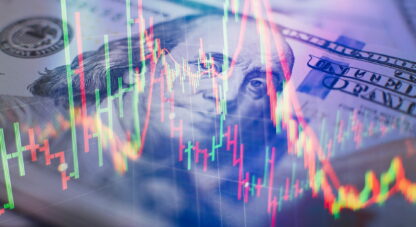Podcast: Play in new window
- Inflation is the next global pandemic
- China's Debt to GDP 280% & that's an understatement
- For every $1 of productivity, $50 goes to the rich
The McAlvany Weekly Commentary
with David McAlvany and Kevin Orrick
When Is Enough Enough … Or Not Enough?
May 24, 2022
“When you combine inflation with economic stagnation, you get stagflation, something Stephen Roach most recently has been talking about with CNBC and saying, “No, you’d be a fool to think that inflation has peaked, and stagflation is all but inevitable.” Everyone is being forced back to the basics on the basis of budgetary constraints, but it’s everyone but the leviathans.” — David McAlvany
Kevin: Welcome to the McAlvany Weekly Commentary. I’m Kevin Orrick, along with David McAlvany.
I was reading Exodus 5 this morning, and that’s the story where Pharaoh takes the straw away from the Hebrews and tells them to make as many bricks as they did before. What was happening before, of course, was they were being given the straw while they made bricks, but now they had to go out and find the straw. And I was talking to my wife at breakfast and I said, “Gosh, that is a lot like inflation.”
David: It totally is. It’s the frustration factor of someone who was already busting their tail and was having a hard time getting done what needed to get done.
Kevin: Now they have to have a second job. They can’t be with the kids. I mean, it’s just wearing them out. Inflation does that to all of us, doesn’t it?
David: Well, that’s right. And it’s one of those factors that impacts psychology in a very meaningful way. And it’s one of the things that central banks are very resistant to see take root. They don’t want to see the psychology shift because they know that it changes human behavior in a dramatic form.
Kevin: It hit me too, though, Pharaoh was worried that the people had overwhelmed the Egyptian people. In other words, they had multiplied. And if you want to keep people from being able to unify in anger with the government, you just keep them busy and you wear them out. Now I’m not saying that’s necessarily the goal with inflation, but you look at China right now, Dave, and I would imagine leadership in China at this point needs to keep the people very, very busy because things are changing.
David: When is enough enough? Or if you’re talking about the numbers that we’re seeing out of China, maybe it’s not enough. China’s now up to $5.3 trillion in stimulus money. And that’s the quantity of dollars coursing through the veins of their economy this year. That might not be sufficient. You’ve got Covid zero policies closing large parts of a $17 trillion economy, on top of the already dynamic declines in the credit markets, which have been led by the real estate development sector being in a real dire place. And that puts Beijing leadership in a dangerous position. But can you imagine $5 trillion in stimulus being inadequate?
Kevin: They’re printing money out of thin air, but they’re telling people they can’t go to their job. They can’t do something. So in a way, it’s a different way of taking straw away. Now they just can’t go work, so let’s just print money. Ultimately it does create the inflation, however. $5.3 trillion, you don’t just “stimulus” that into the economy, without it creating inflation down the road.
David: Where there’s danger, there’s also opportunity, and the politics of the Communist Party are anything but boring today. You have Xi Jinping, who may have his election victory buttoned up later this year, and he may not. You’ve got party infighting. That’s increasing. And all of a sudden the political engineering that Xi has orchestrated over the past five years, while it has left him in a stronger position, it has not provided a guaranteed path to a third term. This would be unprecedented since the ’90s.
Kevin: Yeah. Our Federal Reserve at times feels like they can control the markets, but markets are larger than what can be controlled. And I wonder if Xi, if market forces at this point aren’t overwhelming him.
David: Yeah, the dynamics in play may be well outside of his control. In the history of the state, they’ve never witnessed these kinds of dynamics before, with massive growth in asset prices. You’ve had basically the gift of the People’s Bank of China and the gift of a once-in-a-century migration, that dynamic from the country to the city. And now there’s this deflating of a gargantuan real estate bubble. It’s a problem a long time in the making, with ghost cities being something that’s been featured in newsreels going back many years. And it’s not as if those cities have ever filled. The idea was you build it and they will come, and this mass migration from the country to the city would fill those places and there would be economic activity.
But now it’s just too much credit flowing, misallocation of capital into the developer sector and a gargantuan real estate bubble. Tied to that bubble are the trillions in credit obligations, both in the banking sector and in the Chinese shadow banks, where wealth management products and a whole host of other venues for investment and speculation have funded the excess growth in real estate values. These kinds of market undercurrents, they’re fresh to the central planners of China and to a central planned, quasi market oriented economy. It’s not a pure free market economy. I think actually the cadre in charge is only a little bit comfortable with “free,” that word being associated with the word market.
Kevin: So if Xi can’t control completely the markets, he’s probably going to try to control the opposition. Going back to what we were talking about, Exodus 5, Pharaoh tried to control the opposition by taking away their straw. Xi’s competition actually, probably, are the corporate executives, the concentrated owners, like what we saw with Putin and some of the oligarchy there. This whole common prosperity, that’s a euphemism for redistribution of wealth. Do you think that’s how he might also control the opposition?
David: Yeah. I mean, political vulnerability is an interesting thing to watch right now. He tried to squash that through taking away the power of corporate executives, and the great Jack Ma, one of the wealthiest men in the world, all of a sudden is publicly humbled and gets on board with the themes of common prosperity. I think his alternatives were something akin to a reeducation camp.
So political vulnerability comes from Liu He, a brilliant and skilled political operator. He’s the vice premier and top economic official, and Li Keqiang, who’s the premier. These are really bright guys, and their policy inclinations are not always in sync with Xi’s common prosperity.
You had a Financial Times article last week that featured a number of insights from one of our previous commentary guests, Victor Shih, who teaches political economy at the University of California, San Diego. And Xi has effectively neutralized much of the power that was accruing to corporate executives and concentrated owners of platform companies and digital enterprises. He’s done that over a multi-year period under the guise of common prosperity. And actually, Liu He has aided in that. They’re teammates in many respects. Now with a faltering real estate bubble, there are concerns over economic growth, which are not perfectly compatible with the control and security aspects which are preferred by Xi. So the priorities that Xi has are not universally agreed upon, that those infightings amongst the members of the politburo, that’s what becomes very intriguing as we come into this election cycle.
Kevin: Any leader, when they’re trying to maintain power, consolidates their friends list. They basically remember who’s been with them and who will stay loyal to them going forward.
David: And Xi calls it the Fujian clique, the committed group of loyalists who have been working with him from 1985 through 2002. Victor Shih is the first to recall that this faction reinforcement, the competition that happens within the party, it’s not new, very common actually going back to the period under Mao Zedong. And in the end, this may have little influence on Xi’s hold on power, but it does define domestic priority differences and the tools used to maintain stability. And we’ve got some things that are destabilizing both from a financial markets perspective, which in turn has economic consequence, but also from a geopolitical perspective, which we can talk about later.
Kevin: One of the things that you and I have talked about often is how we’ve got to be careful that we don’t think within our own paradigm. Okay, from a Western business paradigm, you would imagine that China’s going to make their decisions based on economic gain. That’s just how we think in the West. But what we’ve seen with China, and we’ve seen this all through the years, they prioritize oftentimes things that don’t necessarily lead to economic gain. Look at this Covid lockdown thing.
David: Well, and that is one of the differences. Liu He is bringing emphasis to the growth strategy of the next 30 years and how they do intend to support technology companies, and that the move towards common prosperity and the leveling of control and influence should not be misconstrued as an anti-progressive move. And so he’s changing some of the language. I’m not exactly clear on whether this is in complement to Xi Jinping, or if it’s actually a bit of competition as he focuses more on the growth strategy and Xi on more of the security strategies, if you will.
Kevin: Yeah. And see, that’s what puzzles me, this hard line taken on Covid. If there is a power struggle and it involves money as well, then why would you just shut everything down?
David: This comes up in many of our weekly calls for our asset management company because they’re willing to take an economic hit, and it’s because of the frailties within their hospital and medical system, which would be easily overwhelmed by a tsunami of Covid cases. So we’ve seen the hard line taken on Covid, with the economy willingly put at risk. And that’s the bottom line is they don’t have capacity to deal with hospitalizations. They don’t have a medical system. And again, when you’re talking about small percentages, you can almost be dismissive of things, but small percentages in a country of scale, you really are still talking about large numbers. A population of 1.4 billion, small percentages, you’ve got to be able to look at those capacity constraints and say, “How, from a policy perspective, do we navigate?” So they’ve chosen the Covid lockdowns.
Kevin: And that’s the thing that’s amazing because, yes, small percentages can add up to large things, but look at retail sales. I mean, for the whole country, retail sales are down over 11%.
David: Yeah, no surprise, retail sales are down 11%, industrial output slips 2.9% year over year, 7.1% month over month, with lockdowns in effect. This impacts the consumer and it also impacts the producer. So retail sales via the consumer, and industrial output, the producer commentary there. And of course the global knock-on effects are that supply chains remain as strained as ever, reinforcing the inflationary trends that we have globally. Not the only, not the primary input for inflation, but certainly something that buttresses it.
So supply chains remain as strained as ever with the production shut down, and also with the arterial transportation and distribution channels blocked. So that may loosen. Shanghai is supposed to open some stores this week. But this issue of sensitivity to caseloads and hospitalizations, these are metrics that influence policies, and I think the markets are growing hypersensitive to the notion that all we need is a bad week in terms of the Covid metrics and we’re right back to the same issue of shutdowns because of the hospital constraints and the medical facility constraints.
Kevin: So you’ve got to wonder, I mean, GDP, gross domestic product, they have to keep that at a fairly high number in China. It’s been dropping. I know they’ve got a goal that they probably are not going to meet. But you and I have talked also in the past that there are ways of stimulating. One is printing money and just throwing it at it. They’ve already done that. The other method of stimulating an economy is fiscal. Just go build more roads, bridges, and buildings. I’m wondering if that’s the direction they’re going to go.
David: The last time I met with Michael Pettis was at his nightclub in Beijing. He’s a finance professor, fascinating guy, very interesting. Was a distressed emerging markets bond trader.
Kevin: Didn’t he start in Spain. Wasn’t that his background?
David: He grew up in Spain, educated in North Africa, and then ended up teaching finance at Columbia after a stint, again, of trading emerging market debt. So he’s got a good combination of the practical aspects of market trading dynamics with—
Kevin: Sort of a polymath in a way.
David: He is. He is, along with a great passion for music. And the nightclub served as a venue for facilitating young artists and creating new music in China. So the China music scene Pettis has been a part of for many years.
Kevin: And you read him every couple of weeks. Isn’t it a bimonthly letter?
David: Right. He works with the Carnegie Foundation and does some research specifically on China. We’ve got the GDP growth targets for the year from China, which have no way of meeting the expected levels of 5.5%. That’s his opinion. Beijing is going to do what they can to prevent growth from dropping to 4% or 3%, but in his view, the only way that they can do that is by unleashing a fresh wave of infrastructure spending.
So here we are back to feeding the beast. It’s reminiscent of what we’ve done here in the United States. We have a credit problem, we feed the credit beast. We have a credit crisis, and instead of letting the credit crisis resolve itself, we come back straight— It’s like the Gods of the Copybook Headings, the burnt bandaged finger goes wobbling back to the flame. We have a problem with building too much stuff in China, and yet that’s going to be the only policy solution where you can deliver a massive amount of money into the system. And his view is that this is a massive disappointment in terms of the composition of growth.
Kevin: What is their debt-to-GDP? I mean, it starts to become all debt and no GDP, right?
David: And his view is that they’ve overstated GDP for years, and a part of that is an accounting function, but some things have been miscounted, misattributed. And so you’re dealing with an inflated GDP figure, which makes the debt-to-GDP figure look better than it actually is. It registers roughly 280%, not adequately capturing the systematic overstatement or the impact of— Now, if you want to talk about even a more disturbing aspect of debt-financed growth, add another 60 to 70 percentage points to that, which is more realistic in Pettis’ view. So you’re pressing 350% debt to GDP.
Kevin: And so, okay, speaking of debt, because again, if you want to stimulate an economy and you’re just not getting it naturally, you print money or you go build things. That’s the fiscal side of things. Or you’ll lower interest rates. I mean, look at what we’ve done through the years. And so, I mean, China, we’re in an interest rate rising scenario worldwide. China’s not, right now.
David: Right. So when you’ve got the leadership of the People’s Bank of China, who acknowledge that there’s a bubble in real estate and want to cool it off and then lower mortgage rates, you have to say, “Well, okay, what is their real view then?” I mean, because lowering mortgage rates would suggest that they actually want to support and revive the real estate sector. And I think that does speak to a level of desperation that’s being felt in China today. So—
Kevin: They might be terrified. Yeah, they might be terrified, David.
David: Right. So if you’re lowering mortgage rates in a direct attempt to revive the real estate sector after in recent months talking about the fact that real estate is bubblicious— If in fact the real estate bubble’s bursting in China, it remains unclear what measures are going to be, in the end, in the final analysis, necessary for a revival to succeed.
But management of any sector in the midst of a contraction, this is what’s new. When I was talking about those dynamics, which are fresh, they’ve never had a bubble this scale before, and they certainly have never managed through and tried to promote growth in the context of a bubble implosion, right? So cyclical volatility is one thing, real enduring, secular change is another altogether. And so their policy choices, it’ll be interesting to see how this plays out.
Kevin: Well, and you think about human nature because sometimes you can compound a problem just by creating uncertainty. One of the things you and I have looked at as far as perception management with the Federal Reserve over the last 10 years is they needed to keep us certain of certain things. And when you’ve got these Covid lockdowns, who knows where interest rates are going to go? They’re saying they’ve been wanting to quiet the bubble down, yet they’re lowering interest rates. It creates an uncertainty, and at that point, people, don’t they slow down their own spending and start saving instead?
David: Exactly. So if you look at globalization, while there are myriad themes to explore here, as it relates to globalization, two things specifically tied to China stand out. One, let’s go back to the retail sales in China. They’re off, which is logical given the Covid lockdowns. But the penchant to save more is also reinforced, and it’s reinforced by the arbitrary nature of the lockdowns, which means that the consumer doesn’t know what’s happening next. They need that resource and they don’t know if it’s going to happen again next week. And so you change the way you engage the marketplace. You’re saving more, you’re spending less. Chinese consumers react and the economy reflects that.
So there is a longer-term impact to Chinese retail sales as a result of the arbitrary nature of these lockdowns. But global supply chain managers also react. If there’s a new— If there’s an enduring form of supply chain insecurity coming from Covid-sensitive health policies, or from public policy management as it relates to Covid hospitalizations and deaths, then you’ve got supply chain managers who have to find redundant sources. They have to create new relationships to establish a more reliable supply chain.
And this is one of those aspects of, no, we’re entering a new era where prices are going to be higher, where inflation is a lot stickier. And I think it’s one of the aspects of globalization that’s being pressured today. If you look at the 2020 to 2021 supply chain disruptions, they have yet to be resolved, and that the Beijing Covid policy sensitivity means that those strains, they don’t have a relief date. It’s not, okay, this ends next week. No, actually the concern amongst supply chain managers is now, when did this get re-implemented, and we’re back to square one again, scrambling for products and delivery dates, et cetera, et cetera? So the longer they linger, the more lasting the impact as global companies adapt and change to resolve the issue.
Kevin: So adapting and changing because that’s true, we all adapt and change, and if it’s based on uncertainty— I think of those tests, those psychological tests, where they let you pass if you answer the question correctly, but they shock you if you answer the question incorrectly. Right now, the shocks are coming at levels that are unpredictable.
David: I never saw those kinds of psychologists by the way.
Kevin: Well, I’m glad that you didn’t. But okay, let’s just think about this because adaptation can come from the West, too. I mean, they’re having to adapt to— You’ve got Putin in the Ukraine right now, you’ve got sanctions, the potential for sanctions in countries, not only like Russia, but you’ve got sanctions possibly coming in China. So that adaptation, not only does it cost more money. That adds to the inflation. So there’s a lot of printed money. There’s lower interest rates, there’s fiscal spending and then there’s uncertainty. So I guess that’s the fourth aspect adding to the inflationary picture right now.
David: Yeah. I’d like to think that when we have a guest on that there’s an implicit plug for a book, and sometimes there are books that are very difficult to read and I can’t genuinely endorse them as pleasure reading, it would be almost more of a spiritual discipline to march through and trudge through.
Kevin: Like an 800-page book on interest rates? Yeah, I never did quite get through that one.
David: Woodford’s Interest and Prices.
Kevin: Yeah.
David: No, but one that is a must read, particularly since the World Economic Forum this week has at the tip of their tongue the consequences of de-globalization is The Creation and Destruction of Value by Harold James. The creation and destruction of value the globalization cycle—
Kevin: We read that about 10 years ago—
David: We did. We did. So I mean a lot of new listeners wouldn’t even know that Harold James was on the program to talk about that. But as Niall Ferguson from Harvard says, “The Creation and Destruction of Value confirms that if you want to understand our current predicament, history is a much better guide than economics.”
And sometimes we’ll have, again, the World Economic Forum looking at economic statistics and they don’t have in mind the history, which gives them a better guide as to how globalization comes together and comes apart—and James would say previous globalization episodes, and with war and highly disruptive and contagious financial crises. So I mean, the fact that we have brewing wars and financial crises and discussion about the end of globalization, if you don’t understand what globalization is or understand what it was, let’s say going back to the Roman Empire, where again, Roman coins are trading in modern day Sri Lanka and Vietnam, because—
Kevin: Because they were made of gold.
David: And the empire was expensive, and trade was everywhere, and capital flowed as far as the roads were built.
Kevin: Well, let’s take the late 1800s. We had a globalized economy at that time because, again, we were on a gold standard, there was certainty, and there was empire. At that time it was the British Empire. We talk about British sovereigns, and we sell them here, but those little British sovereigns, the sun really didn’t set on the British Empire, they were minted on five continents, Australia, South Africa, India—
David: What I love about the sovereign, because again, you’re talking about, let’s call it 1850 through, really, the Second World War—1850 to, let’s call it 1933.
Kevin: It was the coin of the realm.
David: It was the coin of the realm. And when you think of a gold sovereign, what you’re really looking at is evidence that a previous period of globalization was there and then faded.
Kevin: We call it the industrial age, the industrial explosion. Well, how can you do that? Well, it created certainty.
David: Now the critique is that this most recent period of globalization was not true, healthy globalization, but some form of hyper-globalization amped up on leveraged finance. And you can certainly see that leveraged finances played a part of this period of globalization, and certainly see that the frailties of the current system are tied to that leveraged finance.
Kevin: Well, including alliances, Beijing, Moscow.
David: Yep.
Kevin: At this point, who would’ve thought? I mean, I guess we could have seen it coming.
David: Yeah. There are many other globalization aspects there in motion. I mentioned the first. I wanted to talk about retail sales in China and lockdowns, the two aspects that are tied specifically to China. I got off track a little bit. But I wanted to make sure that if anyone is curious about how current events are unfolding, if you want some insight, you could start with going through archives and listening to the interview with Harold James on The Creation and Destruction of Value, but better yet, order a copy. It’s a Harvard University Press published book, The Creation of the Destruction of Value: the Globalization Cycle.
There are other aspects of globalization that are in motion—really de-globalization—but that one directly relates to Chinese domestic policies, that is retail sales, ultimately the inflation that they’re dealing with and how Xi Jinping or a successor has to deal with it. The second theme that stands out as it relates to China and de-globalization is this alignment between Beijing and Moscow. And there’s a reinforcement of geopolitical concerns, both in Europe and in Asia, and it’s forced governments and boardrooms alike to consider the vulnerabilities that exist, vulnerabilities to resources, access to resources, reliability of those sources, and vulnerabilities to even the finished products. Sourcing due to—
Again, we’re now dealing with something we haven’t really had since the close of the Cold War, alignments and misalignments of interest in an area that’s been largely dormant since that period. We’ve been living in relative peace, and that’s made for greater global cooperation. It’s meant that you really don’t have to hedge your bets. You don’t have to hedge your bets because it’s win-win for everybody, right? You’re not really concerned about a zero-sum game. It’s, “let’s just grow the pie and everybody enjoys a larger slice.” So this appears to be a fresh challenge to global trade and the free flow of capital across borders, beginning to look at the alignments—and what some would view as misalignments—of interest as geopolitics becomes more intriguing.
Kevin: Well, more intriguing. Harold James calls “more intriguing” war. The end of globalization, each cycle, ends in war. And the Wall Street Journal last week talked about how China’s doing things that look like preparation for war. I mean, the Chinese elites are being told to get rid of their overseas assets. So you’re starting to see, you know how, when we see preparation for war, even in the United States, or like with Kuwait or Iraq or what have you, you pull your people out, you pull your investments out, you start preparing to not be vulnerable to what could come at that time.
David: Yeah. And I think one of the things that’s also fascinating is that James points out in his book, in one of my favorite chapters, the weekends that made history. And you can see how there are defenders of the market late on a Friday afternoon because you don’t want a redefining weekend. And so many of the redefining weekends, the redefining weekends of 1929, of 1931, of 2008—
Kevin: I remember the redefining weekend of 1987.
David: Sure.
Kevin: Yeah, that Friday. It was like, “Uh-oh, Monday’s going to be bad.”
David: Well, that’s right. That’s right. So there’s a lot of gamesmanship. Gamesmanship can be roughly translated as direct marketable manipulation that the SEC should, but does not, care about. And this happens late on a Friday, in large part because you don’t want the next weekend that makes history.
It’s different than past periods of globalization, where a lot of the problems cropped up at the periphery—where you had small countries, and then there were implications for large countries and overextended bets into those small countries. Now you’re dealing with core countries. You’re dealing with sovereign debt, and you’re dealing with the sovereign debt of developed countries as well as developing countries. There really is no place that is unaffected by the changes in motion at present.
Kevin: Dave, during the Global Financial Crisis, you and I commented over and over how many times the powers that be were meeting on a Sunday because they were in the middle of a weekend that was potentially going to change history. You remember those Sunday meetings? Larry Summers—
David: Oh yeah.
Kevin: Yeah.
David: Well, it’s one of the reasons why, as an asset manager— There’s a difference between being an asset manager and a financial advisor. A financial advisor can largely take the weekend off. Most of the responsibilities for investing are delegated to fund managers anyways.
Kevin: You guys on Sunday afternoons have to look at what’s going on in the market.
David: It’s a 365-day-a-year job. It’s more of a dairy where you show up early, you stay late, and you don’t have weekends. And that’s just the kind of work that it is. But coming back to China, according to the Wall Street Journal last week, China has insisted that all party elites dispose of their overseas assets.
Kevin: That’s huge.
David: I mean, this is not common. This is not common. This is not precursor to the next round of positive trade agreements. The internal party directive is now barring officials from owning property abroad or owning stakes in overseas entities, either directly, through spouses, or through their children.
So this was the Wall Street Journal article last week, and again, this is the top of the top of the party. They’re battening down the hatches. Does this sound anything like a response to what they just witnessed in Russia where anyone with influence or power has been cut out of the financial market system? Basically what they’re doing is saying, take away the leverage from the West, eliminate all ties that can be used to control, manipulate, or otherwise limit your ability to operate.
Kevin: So this is preparatory? Is it preparatory for war ,or not?
David: Well, what that means, I have no idea. But from Kyle Bass’s perspective, this is a pretty sharp hedge fund manager out of Texas, Hayman Capital, China is preparing for war, in his opinion.
Is that the case? It’s not clear, but certainly when they go through the process of insulating banks from potential US sanctions, hoarding grain for over a year, updating the foreign investment law, which gives the state the power to nationalize foreign assets and detain expatriate employees, what does that all look like? It looks increasingly like they’re gearing for conflict. And maybe it’s the Biden’s commentary on backing Taiwan, perhaps it’s the naval incursions in recent years throughout the regionally contested waters of the nine-dash line. But there are implications to diminished cooperation and trade, and those implications are already a fait accompli. The far greater implications deal with events that have not yet occurred and may not occur.
Kevin: Okay, so let’s say you own a corporation that is thinking about putting more money into China.
David: But can you imagine a full stop to trade and cooperation? Now you’re talking about greater implications.
Kevin: That’s what I’m saying. That’s what I’m saying. Okay, so let’s say you’re expanding ICA into China or let’s—
David: That’s a good market, like gold.
Kevin: Yeah. I was going to say. Let’s just look at the question we’ve been asked for decades, and that is when are you guys going to start storing gold in China? And we do, we can, but we don’t recommend it. So the question would be—
David: So the most fascinating conversation I had on that was with our largest Indian client, this technology family, very well established globally, with operations globally. And I asked them, “Would it be of interest to you to have storage in Hong Kong?” “No,” was the very sharp and short answer. “Why?” “Because it’s an extension of the Chinese State.” And of course this was 5, 6, 7 years ago.
And then I said, “Well, we’ve had some investor interest in Singapore.” And their response was, “Only from Westerners who don’t understand that the geography is indefensible. You’re at the end of a peninsula, and nothing stops you from going from one end to the other.” And you start looking at things from a geostrategic standpoint, and you think, yeah, actually Singapore’s not a very good place to have your money.
Kevin: You know what’s interesting though? I’m just listening to you. If you were the CEO of McDonald’s right now, you’d be making the same decision. It’s like, wait a second, do we really want to have McDonald— I mean, they’ve already pulled out a Russia, right?
David: Right. And I think that the big point here is that if you end up having a strained relationship with China, you’ve got a lot of invested assets—
Kevin: Already.
David: Already. Western assets already in China, you’ll be saying goodbye to those assets. So the tip of the iceberg is loss of assets for corporations that have poured in hundreds of billions of dollars into China. And the Russian investment in that landscape is a reminder of what can happen overnight.
Kevin: How many stores was that? Over 600, right?
David: For McDonald’s, they’re trying to divest of 650 stores. They need to find a buyer. They’ve got 60-something thousand employees there, and hopefully somebody buys them and operates them as, I don’t know.
Kevin: I wonder if the Hamburglar is going to look like Putin. This’ll make people mad that I said that, but you remember the characters. I wonder whether he’ll be Big Mac or he’ll be the Hamburglar.
David: Maybe Ronald McDonald will look a little bit more like Gorbachev and have that little red mark on his head. Okay.
Kevin: The ketchup, yeah.
David: The far greater numbers, they relate to global GDP, because I mean, again, if you have locked-up assets or take a loss on a trillion dollars in assets of invested capital in China, okay, that’s one thing, but the greater numbers relate to global GDP and the trillions, trillions, in trade—which occur not only regionally throughout Asia, but globally from East to West and back and forth, from Europe to China and from the US to China and vice versa.
So temporary supply chain constraints, that’s a small problem. And yes, it’s caused a big issue in terms of domestic inflation for us and for many other places in the world. It’s exacerbated an existing inflation problem, but it’s a small problem compared to the inflationary aspects wrought from an end of a period of global free trade with a redesign of the existing trade architecture being forced, and that being forced in the context of crisis, as opposed to a redesign process carefully considered, planned out in advance, years in advance.
Kevin: Yeah, I just wonder. As we were talking about some of the environmental push, you had these guys, all of them were rich, flying into Davos, landing at the Davos airport there in their jets, talking about decarbonizing the atmosphere. It seems like the World Economic Forum, they’re talking about planning. And see, we’re not talking about globalism here. The World Economic Forum is talking about globalism, which is leadership from the top of many countries, just having an elite leadership. That’s the World Economic Forum. And it’s the very rich. I mean, that’s a technocracy.
David: Well, they know better than anyone.
Kevin: Techno oligarchy is what I meant to say. That’s what I meant to say.
David: Right. No, that’s even more accurate. But they’re the crowd that knows how to make a decent-size carbon footprint, and they’re interested in monetizing a new tradable asset class. I think that the sensitivity to carbon footprint, it’s not all altruistic. My sense is, the Davos crowd, meeting at the World Economic Forum this week, is a little bit on edge. They’re on edge because they see that playground etiquette is getting a little rowdy, a little unruly, a little bit beyond their ability to control and police.
Kevin: Maybe they need to take straw away. You think maybe at this point they need to divest of straw or divest of giving us straw?
David: Yeah. Well, divest of fossil fuel and let’s see if the effort to maintain low energy costs for families goes up or down.
Beyond idealism there’s trade offs and people have to be cognizant of those trade offs. Dani Rodrik is again that I occasionally read at Project Syndicate. He’s a Harvard professor, and he was referenced in a Financial Times article in the last day or two. He said that for every dollar of efficiency gain from global trade, that there’s been $50 worth of redistribution towards the rich.
Kevin: Wow, wow! For every dollar of efficiency gain globally, there’s $50 worth of redistribution to the rich.
David: Now I’m fairly certain that he’s taking the tone of social critic, and there’s not a mathematical formula that pencils out 1 to 50.
Kevin: Yeah, but there has been a division between the rich and the poor that’s widened.
David: No doubt. And treasuries of the world are looking at how they can even the socioeconomic scales. That clearly is a wave of the future.
I think you might expect that kind of critical commentary—again, poking a finger at the rich or whatever, a sharp stick at the rich—to be coming from the economics departments of a Harvard or a Berkeley. But there’s another point to keep in mind beyond the critique of hyper-globalization which Dani’s pretty keen on. You gain a dollar, and there’s $50 worth of redistribution towards the rich. Let’s take the other side of that. You lose a dollar of efficiency gain from trade, does that imply an impairment of the leveraged advantage which has accrued to the rich? So again, if plus 1 equals plus 50 in Rodrik’s distributional equation, in the context of deglobalization does minus 1 equal minus 50? Because now you’re talking about asset impairment in a world of hyper-leverage that may deliver you a global depression the likes of which the world has never seen.
Kevin: Well, and a global depression this time would be inflationary. That’s the thing that’s really amazing. Dave, I think through the inflations of the last hundred years. Okay, so the Weimar Republic in the early ’20s. Okay, Argentina, over and over. Venezuela, look at what happened in Venezuela. We could go on and on. Those were all isolated to those countries. We have— You talk about a global pandemic. It’s not Covid, it’s inflation. Have we ever had a worldwide inflation?
David: No. No, not on a global basis. No, it’s country by country because it’s typically driven off of one terrible set of fiscal policy rules and one terrible set of monetary policy rules coming together and creating a mash-up that is disastrous for the common man in that particular country. So households are devastated by the terrible mash-up of fiscal and monetary policies. And those are things that are done on an idiosyncratic country-by-country basis. But in this case, post-Covid, we have a universality of fiscal policies, a universality, a similarity, a replication of fiscal and monetary policy.
So we already have a second global pandemic, to your point. Call it inflation. It’s infecting every economy on the planet, and affecting every person on the planet. A bad idea is how this starts. A bad idea, set out as monetary policy, and then it spreads endemically throughout the world. That’s the root of our inflation. And it goes back even many decades. If you come off the gold standard and create a fiat money system, you can take it back to that and then exaggerate it. It’s driven and exaggerated by the ivory tower theorists and the central bank activists. Add to that the fresh pressures brought into play by de-globalization. Now we’ll have to live with the increase in trade frictions, increased input costs for natural resources that stem from sourcing limitations and trade disagreements. And on the flip side, you’ve got excess demand driven off of fiscal policy largesse, and you have an unbearable caseload with no immediate cure.
Kevin: Oh no, wait, no, no, maybe there’s a vaccine. Have you called Pfizer to see if there’s a vaccine for inflation?
David: Listen, they have vaccines for your five-year-old, for your parakeet, for your cat, your dog.
Kevin: Did you see they have a pill you can now swallow that can check you? They were trying to sell that—
David: Well, it was promoted. It was promoted a number of years ago. I have a fascinating clip, if you haven’t seen it, the CEO of Pfizer talking about pills that could include chips.
Kevin: A microchip.
David: Right. That send a signal back to— I mean, let’s say you’re a schizophrenic and you need the schizophrenia drug, but your doctor doesn’t know if you’re taking your medicine. Well, this would be able to send a signal back that it was already digested.
Kevin: So he said— Imagine the compliance. But unfortunately I don’t think there is a vaccine for inflation, is there?
David: Pfizer can’t treat consumer price inflation. They might be able to add to it, much to our chagrin. I mean, they’ll try to treat everything, down to your five-year-old or parakeet. With a touch of insanity, MarketWatch ran a story in recent days titled “How Inflation Could Help Us Save Money and the Planet.”
Kevin: I wonder how that works.
David: And basically it’s combining this notion of consumer spending being a critical cause for climate change. So if you reduce consumer spending, you can reverse climate change. And you can take that to some interesting conclusions. If we were to discard our houses and move to caves, we could also do a lot to reduce climate change. Consume less and the world will be saved.
Kevin: Sure. Take their straw away and you save a lot of straw.
David: Well, like we mentioned last week, everyone is being forced back to the basics on the basis of budgetary constraints. That’s not the leviathan, that’s not the state, it’s not the European State or the Chinese State or the Japanese State or ours here in the US, but it’s everyone but the leviathans.
Kevin: So we’ve talked about stimulus, Dave, and you can print money. It feels like stimulus. It’s like going on vacation with a credit card. Okay? Or you can fiscally spend, and build a bunch of bridges and buildings, like we talked about. You can lower interest rates even when they should be rising, and continue to stimulate that bubble. Or you can actually grow, I mean, literally just productivity. You talked about a dollar’s worth of productivity gain right now goes to $50 to the rich, but growth is not a bad way to come out of a crisis. Are we going to have that? I mean, are we going to have real productivity or is this all just smoke and mirrors at this point?
David: Well, that was the hope as we came out of Covid is that we would have this resurgent economic activity and we’d find our stride again. And inflation has been the real equation buster, and it’s been the inconvenient truth in so many respects. It is what is driving home builder sentiment, fifth month in a row of declines, dealing with rising costs, dealing with not only material costs for what they’re building, but also the consumer who’s buying a home now has to face the inflated price as well as a rising rate, affordability is lowering.
Kevin: Yeah, the new home sales, what a disappointment. That was several hundred thousand below what they thought was going to happen this reporting period.
David: Housing data this week, 21% below estimates. Home builder sentiment, fifth month in a row of declines. In manufacturing, both services and manufacturing PMIs, weak this week. Last week, I think very telling, was the heart of our economy: We have to move stuff when we’re actually consuming, using, et cetera, and so to see major, major hits to the Dow Jones Transportation Average, the worst performing index last week, down 6.6%. It made the 4.5% loss in NASDAQ seem very light, very light indeed, for the week. And it suggests that we are getting closer to constraints, and the consumer being tapped out, and the idea of recession being front and center.
So when you combine inflation with economic stagnation, you get stagflation, something Stephen Roach most recently has been talking about with CNBC and saying, “No, you’d be a fool to think that inflation has peaked, and stagflation is all but inevitable.” So, I mean, again, we’re back to the basics. We’ve got our budgetary constraints, the leviathan knows no limits. And in here we find ourselves at a very interesting set of crossroads from the standpoint of global trade and cooperation. Peace is what we hope for, but not always what we get.
Kevin: You’ve been listening to the McAlvany Weekly Commentary. I’m Kevin Orrick, along with David McAlvany. You can find us at mcalvany.com, and that’s M-C-A-L-V-A-N-Y.com. And you can call us at 800-525-9556.
This has been the McAlvany Weekly Commentary. The views expressed should not be considered to be a solicitation or a recommendation for your investment portfolio. You should consult a professional financial advisor to assess your suitability for risk and investment. Join us again next week for a new edition of the McAlvany Weekly Commentary.
















